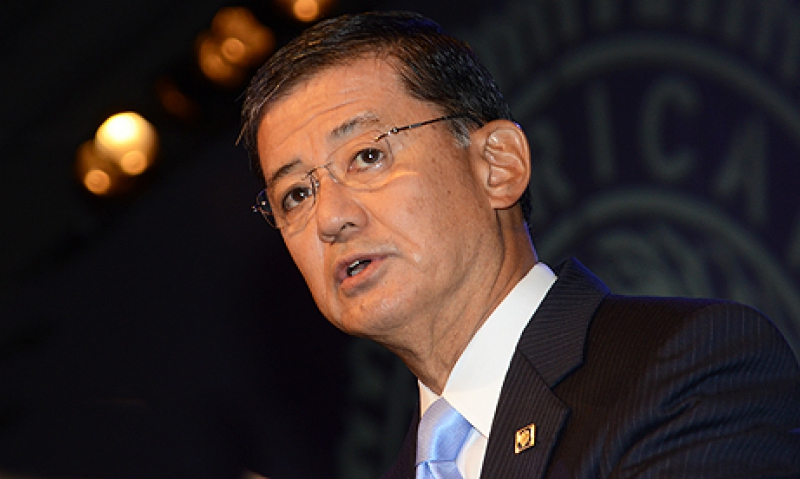
Secretary Shinseki amplifies Obama's message that veterans can help drive the nation's economic recovery.
Employment, business and education have percolated to the top of VA's crowded priority list as more than 1 million veterans are currently unemployed nationwide and at least as many are expected to leave the military in the next five years, VA Secretary Eric K. Shinseki explained Wednesday in an address to the 93rd National Convention of The American Legion in Minneapolis.
"These are tough economic times, and that's especially true for veterans," Shinseki told thousands of Legionnaires gathered in the Minneapolis Convention Center. "If we can spend nine weeks in boot camp getting youngsters ready to go operational, we can find the requisite time to properly ensure their successful transition back to their communities, either to go to work or to school."
Shinseki's address came less than 24 hours after President Obama told Legionnaires how veterans can be deployed to help reverse the nation's economic slide. On Tuesday, Obama shared with Legionnaires a White House initiative to provide tax credits for companies that hire veterans, a development Shinseki said demonstrates the president's "unwavering support of veterans, and of business." He said the credits would apply to long-term and short-term employment opportunities for veterans and a maximum credit of $9,600 per veteran for firms that hire those with service-connected disabilities.
Shinseki added that VA and the Department of Defense "will spearhead a government-wide effort to reform the way members transition out of the military services. Every member will receive the training, education and credentials needed to successfully transition to the civilian workforce or to pursue higher education."
He said an important component of the concept is to stimulate growth and success for veteran-owned businesses, including increased federal contracting opportunities. "We know, historically, that veterans hire veterans. So increasing the number of successful small business owners who are veterans increases our opportunity to ensure that veterans will have job opportunities."
He also said VA itself has set a goal of increasing its own veteran workforce from 30 percent to 40 percent.
Shinseki said more than 840,000 veterans and family members are now using VA education programs, including 518,000 who are using Post-9/11 GI Bill benefits. "This fall, thanks to the Congress, we are going to expand that program to provide vocational training and other non-degree job skills for veterans who want to work but who are not necessarily interested in sitting in a college seat for four years."
The secretary rounded out his address by touching on three VA priorities that have been with him for the two and a half years he has held the office: improved access to veterans health-care facilities, elimination of veteran homelessness and reducing VA's backlog of undecided benefits claims.
-On access, he said the number of veterans enrolled for VA health care has increased by 800,000 over the last two and a half years, and more than 89,000 veterans have been approved for benefits due to exposure to Agent Orange during that span.
"We have made it easier for combat veterans to receive care for post-traumatic stress disorder and have hired an additional 3,500 mental health professionals since 2008," he added. "We have built more than 30 new community-based outpatient clinics, and we are building five new VA hospitals. We have also invested heavily in tele-health care, so that we have a constellation of care out there for veterans."
He also said a women's program coordinator has been placed in each VA medical center, and more than 1,200 care providers have received enhanced training in women's care to address deficiencies in that area.
-Shinseki reiterated his promise to end veteran homelessness by 2015. He said VA has housed 29,000 formerly homeless veterans and provided assistance for another 30,000 through VA's homelessness call center. He also called for a "justice outreach" that would place chronic veteran violators of petty crimes and substance-abuse laws in VA rather than jails, to break the cycle of incarceration.
-On the claims backlog, he said it remains a tall order, but success with an automated application process for GI Bill education benefits "gives us a measure of confidence" that VA claims can be similarly processed, and his goal of deciding all claims within 125 days of filing, with 98-percent accuracy, is attainable by 2015.
- Convention

